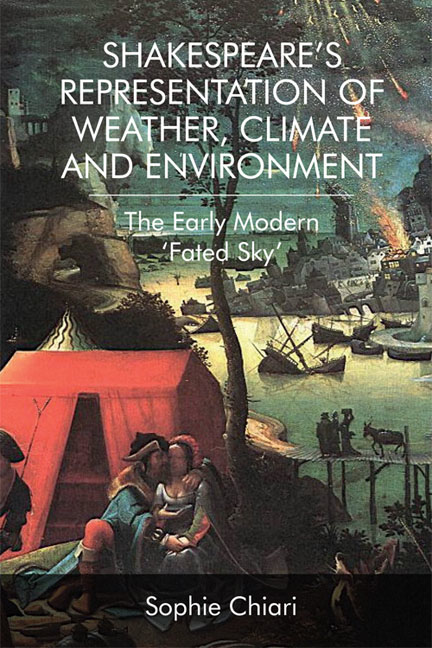Book contents
- Frontmatter
- Contents
- Illustrations
- Acknowledgements
- Textual Note
- Introduction
- 1 ‘We see / The seasons alter’: Climate Change in A Midsummer Night's Dream
- 2 ‘[T]he fire is grown too hot!’: Romeo and Juliet and the Dog Days
- 3 ‘Winter and rough weather’: Arden's Sterile Climate
- 4 Othello: Shakespeare's À bout de souffle
- 5 ‘The pelting of [a] pitiless storm’: Thunder and Lightning in King Lear
- 6 Clime and Slime in Anthony and Cleopatra
- 7 The I/Eye of the Storm: Prospero's Tempest
- Conclusion: ‘Under heaven's eye’
- Bibliography
- Index
Conclusion: ‘Under heaven's eye’
- Frontmatter
- Contents
- Illustrations
- Acknowledgements
- Textual Note
- Introduction
- 1 ‘We see / The seasons alter’: Climate Change in A Midsummer Night's Dream
- 2 ‘[T]he fire is grown too hot!’: Romeo and Juliet and the Dog Days
- 3 ‘Winter and rough weather’: Arden's Sterile Climate
- 4 Othello: Shakespeare's À bout de souffle
- 5 ‘The pelting of [a] pitiless storm’: Thunder and Lightning in King Lear
- 6 Clime and Slime in Anthony and Cleopatra
- 7 The I/Eye of the Storm: Prospero's Tempest
- Conclusion: ‘Under heaven's eye’
- Bibliography
- Index
Summary
‘The ayre of England is temperate, but thicke, cloudy and misty’, Fynes Moryson writes in his 1617 travel diary, An itinerary. This casual observation displays the tensions which Shakespeare's contemporaries must have felt, torn as they were between the love of their country and the acute awareness of its climatic imperfections, between what they longed for and what they actually went through. For Elizabethans and Jacobeans alike, climate could durably affect the nature of men whose humours were temporarily modified, through the skin, by good or bad weather spells. Admittedly, the debate was not then exactly formulated along those terms, but this rough recapitulation encapsulates the general ideas that circulated in many works of the period. Climate and weather-related topics were never thought of as being totally independent from a broader frame of references including cosmological and theological issues. People saw themselves as living ‘under heaven's eye’ (The Comedy of Errors, 2.1.16), as England's capricious skies were then believed to provide a number of keys to predict or simply understand the main threads of their daily existence. Even if, according to Cassius, ‘[m]en at sometime were masters of their fates’ and ‘[t]he fault […] is not in our stars, / But in ourselves’ (Julius Caesar, 1.2.140–2), stars in Shakespeare are often presented as uncanny signs and harbingers of disaster: ‘I believe [these prodigies] are portentous things / Unto the climate that they point upon’ (1.3.31–2), Casca confides to a Cicero who prefers to sit on the fence (‘men may construe things after their fashion’, 1.3.34). As Benson Bobrick reminds us, the astrological predictions in Shakespeare's plays are systematically fulfilled, so that, for the playwright, the heavens seem to have remained a privileged intermediary zone between the natural and the supernatural, the sublunary and the translunary worlds.
Contrary to many plays of the period, Shakespeare's drama is allinclusive and eschews didacticism: he embraces human and natural phenomena without reducing them to conventional symbolism and he features men and women inside their usual habitat and distinctive environment without neglecting more universal issues. On the Shakespearean stage as in the real world, clement skies are generally short-lived since odd celestial events and spells of bad weather often serve to work out a number of dramatic tensions, be they political, social or aesthetic.
- Type
- Chapter
- Information
- Shakespeare's Representation of Weather, Climate and EnvironmentThe Early Modern ‘Fated Sky’, pp. 256 - 266Publisher: Edinburgh University PressPrint publication year: 2017



